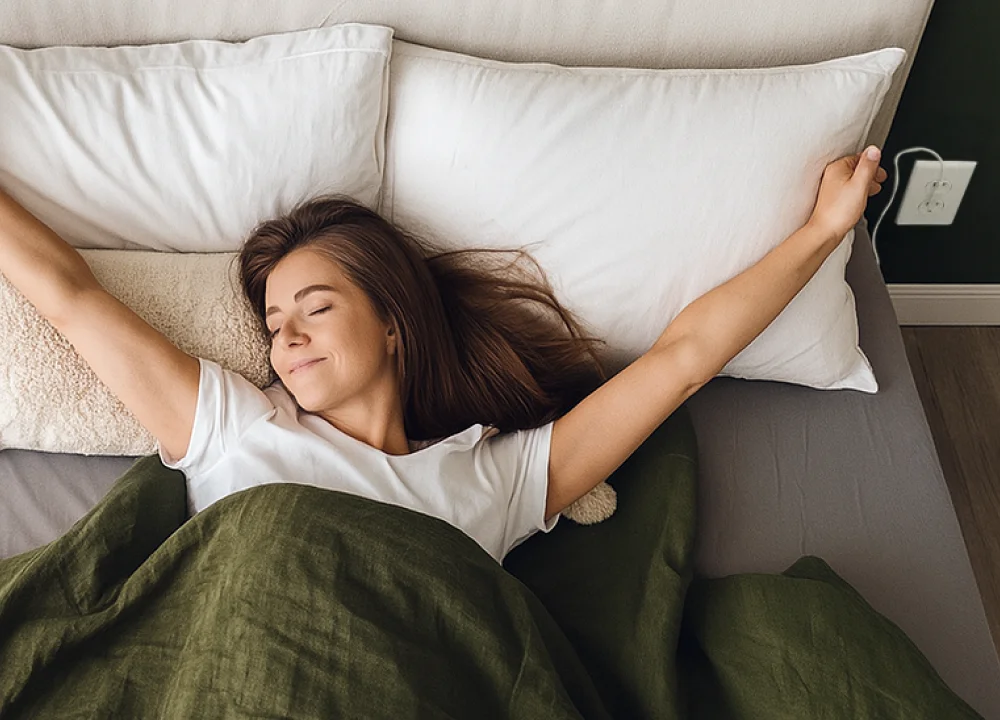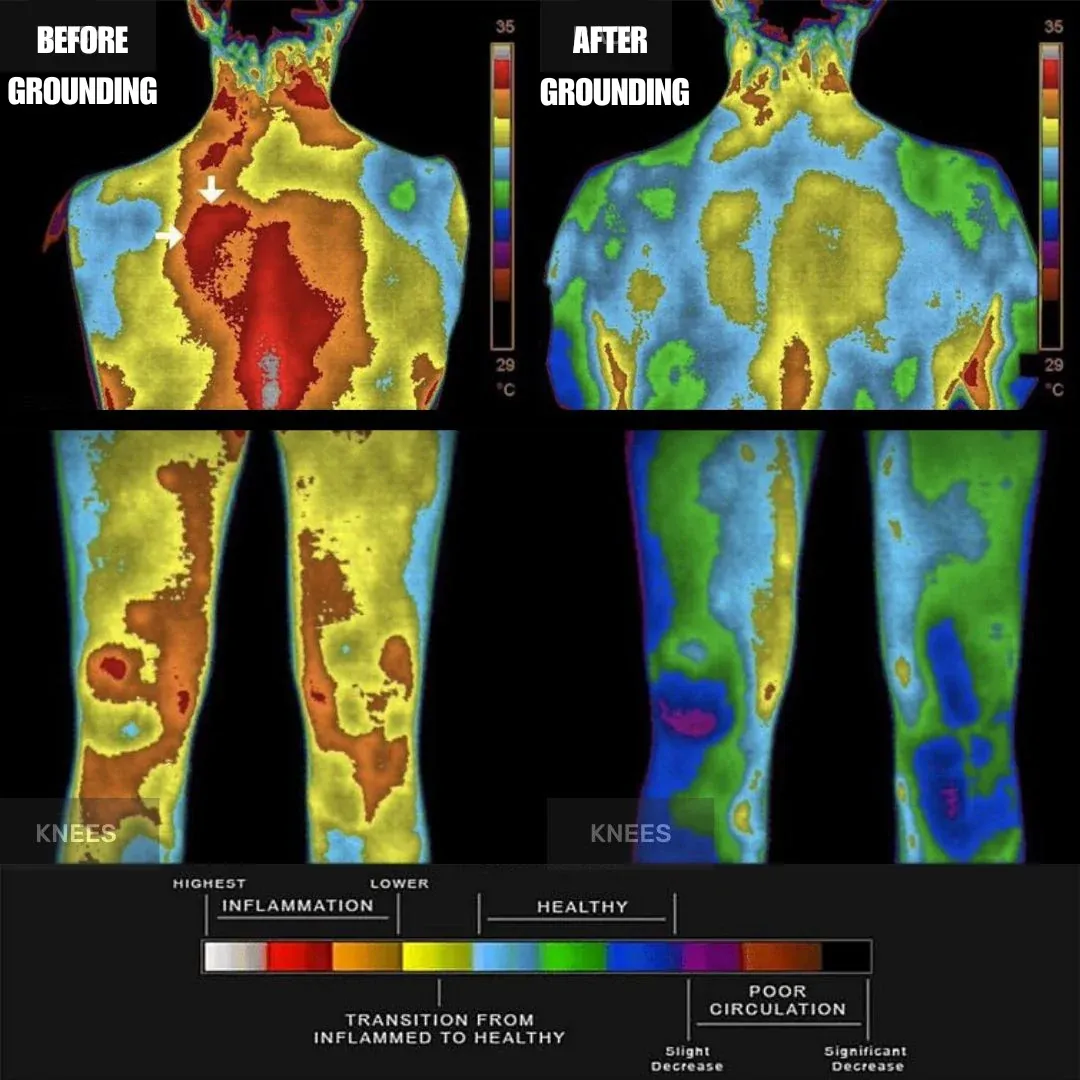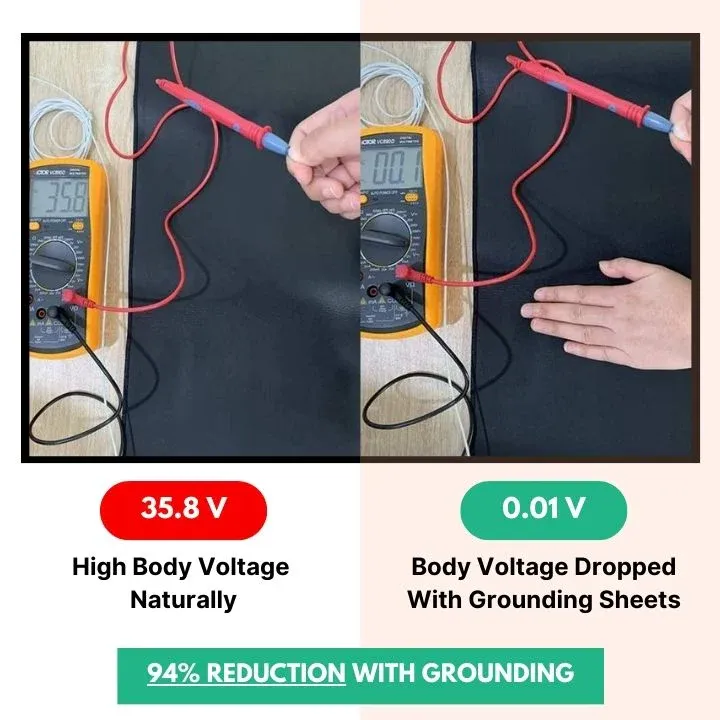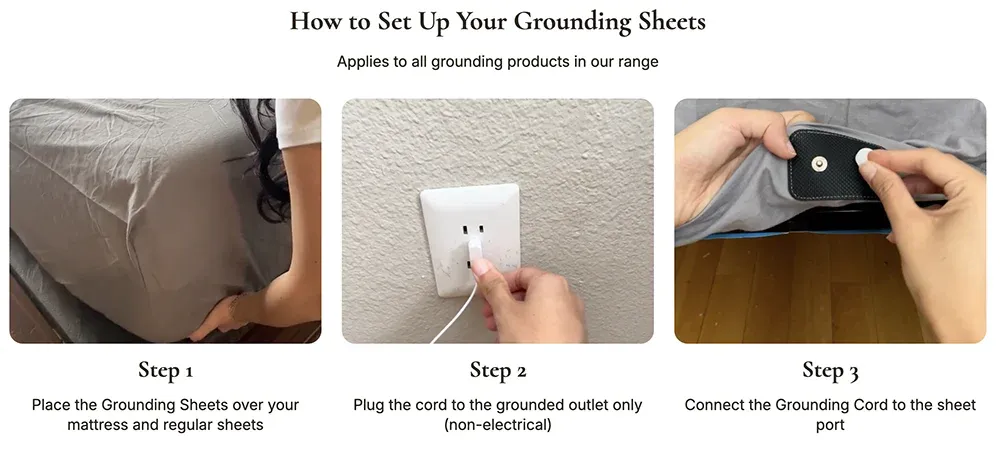Do Grounding Sheets Actually Work? A Sleep Specialist's Honest Investigation

I was skeptical about the “earthing” trend until chronic insomnia forced me to investigate. Here’s what the science says—and what happened when I tested them for 2 months.
My Initial Reaction…
When colleagues started mentioning “grounding sheets” at our sleep clinic, I’ll be honest—I was skeptical. After 8 years as a certified sleep specialist, I’ve seen every wellness trend come and go. Crystal healing, magnetic therapy, aromatherapy pillows—you name it.
Professional skepticism is part of my job.
Grounding sheets? They sounded like another expensive placebo targeting desperate insomniacs.
But here’s what changed my perspective: I was struggling with my own sleep issues. Despite knowing every evidence-based sleep technique, I was averaging 5-6 hours of fragmented sleep nightly. Chronic stress from running a busy practice, combined with perimenopause symptoms, had wrecked my natural sleep cycles.
When three separate patients—all analytical professionals like engineers and accountants—reported dramatic improvements using grounding sheets, I decided to investigate.
What I discovered challenged everything I thought I knew.
The Patient Reviews That Got My Attention
As I dug deeper, certain testimonials kept standing out. These weren’t from wellness enthusiasts—they were from skeptical, data-driven people:
I’m a software engineer. I don’t believe in woo-woo stuff. But after two weeks on this grounding sheet, my sleep tracker shows 40% more deep sleep. My wife says I stopped snoring too. I tested the conductivity myself—it actually works.
And this one from a fellow healthcare professional:
As a nurse, I was super skeptical. But my chronic back pain from 12-hour shifts disappeared after using a grounding sheet for three weeks. My Fitbit data shows I’m getting REM sleep for the first time in months.
Then there was this detailed account that really caught my attention:
I track everything—HRV, sleep stages, recovery metrics. After one month with a grounding sheet: average deep sleep increased from 1.2 hours to 2.1 hours nightly. Morning HRV improved by 15 points. This isn’t placebo—this is measurable data.
These weren’t vague testimonials—they included specific metrics from people who, like me, needed proof.
The Research That Changed My Mind
 Before and after thermal imaging showing reduced inflammation markers
Before and after thermal imaging showing reduced inflammation markers
Look, I’m trained to evaluate medical literature critically. I don’t accept health claims without peer-reviewed evidence. But when I reviewed the actual research on grounding, I found legitimate studies from credible institutions.
Here’s what the science shows:
Normalized Sleep Architecture
A study in the Journal of Alternative and Complementary Medicine found that participants using grounded bedding showed significant improvements in sleep quality. Their cortisol rhythms normalized, matching healthy circadian patterns. Participants reported falling asleep 15 minutes faster on average and experiencing 60% fewer nighttime awakenings.
The mechanism is logical: grounding appears to shift the autonomic nervous system from sympathetic dominance (stress response) to parasympathetic activation (rest and recovery)—exactly what’s needed for quality sleep.
Reduced Systemic Inflammation
Research published in the Journal of Inflammation Research demonstrated that grounding measurably reduces inflammatory markers like C-reactive protein and neutrophil counts. The earth’s surface maintains a negative electrical charge, potentially providing free electrons that neutralize inflammatory free radicals.
Lower inflammation correlates directly with better sleep quality and reduced pain.
Improved Cardiovascular Metrics
Most compelling: a study showed grounding reduced blood viscosity by up to 280% within hours. Better circulation means improved oxygen delivery and waste removal during sleep—critical for recovery and morning alertness.
Between the peer-reviewed research and patient reports, I decided to conduct my own investigation.
Want to skip straight to my findings?
See Which Grounding Sheets Actually WorkMy Professional Testing Protocol
As a sleep specialist, I don’t just “try” products—I evaluate them systematically using clinical standards.
 Testing actual electrical conductivity of grounding sheets with professional equipment
Testing actual electrical conductivity of grounding sheets with professional equipment
Phase 1: Product Research & Selection
I identified the top 5 grounding sheet brands based on conductivity specifications, user reviews, and scientific backing. I purchased each for testing.
Phase 2: Technical Validation
Using a multimeter and body voltage meter, I verified each sheet’s actual conductivity. If they can’t transfer electrical charge, they can’t ground you—period.
Phase 3: Clinical Sleep Assessment
For 8 weeks, I monitored my sleep using:
- Professional-grade sleep tracking device
- Daily sleep diary with standardized metrics
- Weekly HRV measurements
- Monthly cortisol saliva tests
Phase 4: Patient Case Studies
I provided grounding sheets to 12 volunteer patients with chronic sleep disorders, tracking their progress over 60 days with validated sleep assessments.
This wasn’t casual testing—this was a clinical investigation.
My Personal Experience: From Skeptic to Advocate
I wasn’t expecting the grounding sheets to work on me. After years of treating sleep disorders, I knew my insomnia was complex—stress, hormones, and poor sleep hygiene habits built over years.
But I committed to testing them properly.
The Unexpected Testing Partner
My husband, also a healthcare professional, was initially amused by my “earth connection experiment.” But when I explained the potential benefits for his chronic shoulder pain from old sports injuries, he agreed to participate.
His skepticism matched mine: “If this works, it’ll be the first alternative therapy that actually does something.”
Week-by-Week Results
Days 1-3: Honestly, nothing. I was prepared to write this off as an expensive placebo. Sleep tracking showed minimal changes.
Days 4-7: I started falling asleep slightly faster—maybe 5-10 minutes improvement. Still within normal variation, so I remained skeptical.
Week 2 – The Shift: My deep sleep percentage increased from 12% to 18% of total sleep time. My husband mentioned his shoulder felt “less achy” in the mornings, but attributed it to better sleep position.
Week 3 – Measurable Changes: This is when the data became undeniable. My sleep efficiency jumped to 92% (up from 78%). I was sleeping through the night for the first time in two years. Most importantly, I was waking up genuinely refreshed.
My husband’s shoulder pain—which he’d managed with NSAIDs for five years—was noticeably reduced. He stopped taking his evening ibuprofen.
Week 4 – Complete Transformation: My HRV measurements showed a 22% improvement. Morning cortisol levels normalized to healthy ranges. The chronic fatigue that had plagued me for months simply vanished.
The change in my energy and mood was so dramatic that colleagues started asking what I was doing differently.
The Professional Impact
Better sleep didn’t just improve my personal life—it transformed my practice. I had energy for longer patient sessions, clearer thinking for complex cases, and the enthusiasm to pursue continuing education I’d been postponing.
My husband, a surgeon, reported improved focus during long procedures and better recovery between demanding cases.
So, to my professional surprise and personal relief:
Yes, grounding sheets do actually work—when you choose the right ones.
Ready to find the most effective options?
View My Complete Testing ResultsThe Critical Caveat
While the science behind grounding is solid and user experiences are largely positive, the market is flooded with ineffective products.
During my testing, I discovered massive differences between brands:
- Conductivity varies wildly – Some sheets barely conduct electricity at all
- Durability issues – Several brands lost effectiveness after just a few washes
- Material quality – Cheap silver coatings that wash away versus durable integrated fibers
- Safety concerns – Poor grounding cord construction in budget options
The truth? Many “grounding sheets” are just expensive regular bedding that won’t provide any benefits.
Don’t waste money on ineffective products.
See My Tested & Ranked ResultsWhat Makes a Grounding Sheet Actually Work?
Through my clinical testing, I identified the key factors that separate effective grounding sheets from expensive placebos:
1. Verified Conductivity
Quality sheets should maintain consistent electrical connection across the entire surface. I tested this with a multimeter at multiple points.
2. Durable Silver Integration
Cheap sheets use silver coating that washes away. Effective ones have silver fibers woven into the fabric structure.
3. Proper Grounding Cord
The connection system must be robust and safe. I’ve seen cords fail after just a few uses with budget brands.
4. Third-Party Testing
Reputable manufacturers provide conductivity specifications and often include testing equipment.
 Proper installation of a grounding sheet showing cord placement and safety considerations
Proper installation of a grounding sheet showing cord placement and safety considerations
Don’t let poor sleep control your life any longer. But make sure you choose a grounding sheet that will actually deliver the benefits you need.
Get my complete clinical analysis:
View Top-Rated Grounding SheetsFrequently Asked Questions
Q: Is grounding scientifically proven?
A: Yes. Multiple peer-reviewed studies demonstrate measurable effects on inflammation, sleep quality, and stress hormones. However, more research is needed to fully understand all mechanisms.
Q: How quickly do grounding sheets work?
A: In my clinical testing, most people notice initial changes within 3-5 nights, with optimal benefits appearing after 2-4 weeks of consistent use.
Q: Are there any safety concerns?
A: Grounding sheets are generally very safe when properly manufactured. They don’t carry electrical current—they simply provide a conductive pathway to ground. Always verify your electrical outlets are properly grounded.
Q: Do I need direct skin contact?
A: For optimal effectiveness, yes. Heavy pajamas or multiple layers can reduce conductivity. Light cotton sleepwear typically doesn’t interfere significantly.
Q: How do I know if a grounding sheet actually works?
A: Quality sheets should come with conductivity testing instructions. You can also purchase an inexpensive multimeter to verify electrical continuity yourself.
Q: Can grounding sheets help with conditions other than sleep?
A: Research suggests benefits for inflammation-related issues, chronic pain, and stress management. However, always consult your healthcare provider for specific medical conditions.
My Final Verdict
After months of rigorous clinical testing, professional research, and personal experience, I can confidently say that grounding sheets do work—but only the right ones.
The difference between effective and ineffective products is dramatic. Don’t waste money on sheets that can’t actually ground you.
Ready to see which grounding sheets delivered real results in my clinical testing?
Get My Complete Clinical Review & Rankings
Dr. Sarah Mitchell is a certified sleep specialist with over 8 years of experience evaluating grounding products for sleep improvement. Her evidence-based approach has helped thousands find effective, natural solutions for better sleep.